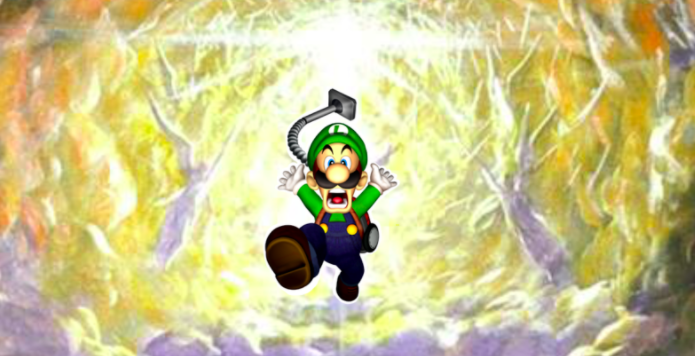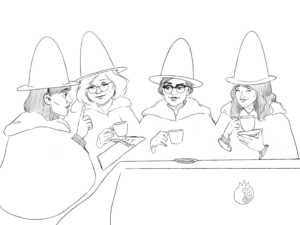In the before times, my partner and I had been wanting to throw a “Drink Talk Learn” Party—a party where everyone has to give a 3-minute presentation about something they’re passionate about, and also there’s drinking! As much as this does seem like the kind of thing that would adapt pretty well to our now socially distant lives, the internet in our apartment is Not Great. So, my brilliant presentation, “Luigi’s Infernal Mansion: Luigi as Pilgrim, Punisher, and Prophet through Dante’s Inferno,” is just Content now. But also I’m still right and The People Need To Know.
Luigi’s Mansion
The plot of Luigi’s Mansion is as follows: Mario was supposed to meet Luigi at this great mansion he just got, but Mario doesn’t show up; we learn that he has been kidnapped by King Boo and his soul is now trapped in a painting. Luigi must cleanse the mansion of ghosts in order to save his brother.
Also, it’s important to me that I point out: all of the events from Luigi’s Mansion represented here OCCUR IN THE ORDER REPRESENTED. I’m not moving anything around to try to prove my point—my point proves itself!
Dante’s Inferno
For those of you not subjected to it in school, The Inferno by Dante Aligheri is a too-long poem about the author’s descent through Hell—the poet Virgil (another famous creator of too-long poems) guides him through the underworld, and together they judge the sinners who inhabit it. At the end, they meet Satan, and he’s pretty chill (this will be funny later). Then they come out the other side and climb up the mountain to Heaven/Paradiso, but that’s mostly in the sequel.
The important thing to know here is that Hell, as Dante imagines it, is split into nine progressively worse rings of punishment, with each ring devoted to a specific kind of sin. It’s a lot to go through, so let’s get into it.
THE BEGINNING
Both stories begin with our protagonists searching for their destination in a dark wood, and they are both scared off of moving forward by a violent force of some kind: for Luigi it’s this ghost; for Dante it’s these three beasts.
They are both helped out of this situation by their guide. Just as Virgil is able to guide Dante past the beasts and safely through the underworld, Professor E. Gadd is able to save Luigi from the ghosts and empower him (with the Poltergust 3000) to move through the mansion safely on his own.
First Circle: LIMBO
The First Circle is hard to really think of as Hell. It holds the souls of the unbaptized: good people who were unable to accept Christ as their savior because they died before His coming; they are materially unharmed, but they do not know Salvation. Christ did descend to Limbo after His resurrection in order to save Adam, Abel, Noah, Moses, Abraham, David, and Rachel, but no others.
So, just like these souls who were left behind, safe from the violent punishments in the rest of Hell, Toad is safe from the ghosts—the narrative would not allow him to be harmed by them—but he is still in this dark place.
Second Circle: LUST
Circles 1-5 are kind of like the Tutorial stage of Dante’s Inferno—Virgil is teaching Dante about the basics of how Hell works and what punishment means for each respective sin. Similarly, the first few stages of Luigi’s Mansion are all about teaching you how to hunt ghosts.
In the Second Circle, the souls of the lustful are buffeted by intense winds (or GUSTS), just as the ghosts are buffeted by the winds of the PolterGUST 3000.
Third Circle: GLUTTONY
In the Third Circle, souls of the gluttonous are cursed to lie forever in an unending storm of filth/putrefaction. This is mirrored in the first specialized ghost you encounter (read: ghost with a specific skill/ability; a ghost that does more than just float around). Once you’ve gotten the hang of buffeting souls with your Poltergust 3000, you progress to encounters with these green bois, who throw nasty banana peels at you so that you’ll slip and fall like the goddamn Marx brother you are.
Fourth Circle: GREED
In the Fourth Circle, the souls of the greedy, weighed down by big ol’ bags of money that they just REFUSE to drop, are forced to joust each other forever. This focus on confrontation (the endless jousting, as opposed to the passive being buffeted or laying in filth) is mirrored in the escalation of difficulty for Luigi to catch a ghost (enter: the first Portrait Ghost, Neville).
Quick note on Portrait Ghosts: they’re just mini-bosses. But also, when you capture them, Professor E Gadd uses a machine to trap their souls in paintings, which is why they’re called Portrait Ghosts.
Neville is a mini-boss, and therefore he is a slightly more difficult ghost to bust. But, he is also the Patriarch of the ghost family that haunts the mansion. And if you look like Nigel Thornberry and you live in a mansion, I feel OK saying that you’re probably pretty Greedy.
Fifth Circle: WRATH
In the Fifth Circle, the souls of the wrathful writhe and wrassle in a sea of filth for all eternity. We get that continued escalation of violence in Hell mirrored in the continued escalation of difficulty in ghostbusting, but we also see a more direct parallel in this first boss: Baby Chauncy.
Chauncy’s final boss move—flopping around trying to crush you with his big ol’ baby belly—resembles the way the wrathful must flop and fight forever in their sea of filth. Also! This is the first boss battle! Just as Luigi must defeat Chauncy, Dante must face Medusa and The Furies in order to continue his descent. It marks the end of the tutorial stage and mirrors Dante’s continuation into Dis: the stage of Hell where things Get Real.
Sixth Circle: HERESY
A lot happens in this next stage, for both of our heroes—Luigi faces many new adversaries and many new challenges; as does Dante. Dis is wild and there’s a lot going on. Namely:
In the Sixth Circle, the souls of heretics are entombed in flame. So, it’s a graveyard, where all of the graves are full of fire and all of the souls are buried and burned forever, alive only to The Suffering.
Back at the Mansion, Luigi learns how to control Fire (and water) using the Poltergust 3000, and how to use those elements to his advantage when busting ghosts. The end of this period is marked by a Boss Battle that happens in the graveyard of the mansion, where Luigi must use his mastery of these elements (read: FIRE) to win.
Seventh Circle: VIOLENCE
In the Seventh Circle, the souls of the violent are pelted with a never ending rain of fire.
After defeating the graveyard ghost, you encounter a new specialized ghost—like the gluttonous green banana bois, but these ones are purple, they drop down from the ceiling, and they throw bombs at you. Also! One of the mini-bosses (Portrait Ghosts) that you fight next is a pair of asshole children who fly around in a plane and also drop bombs on you!
It’s literally raining fire! From the sky! Just like in the Seventh Circle! (This is the point at which I knew for sure that I was RIGHT and I SHOULD SAY IT.)
Eighth Circle: FRAUD
The busting of Madame Clairvoya is an important turning point in the game (but we’ll get more in-depth about why here in a moment). For now, suffice to say: the amount of time and care the game gives to Madame Clarvoy’s dialogue and backstory here is notable—this is a big deal ghost busting, special attention is drawn to it, and it marks a shift in how Luigi functions.
But, for our present purposes, it’s enough just to point out that in the Eighth Circle, Dante makes a point of saying that fortune tellers are punished as frauds.
Ninth Circle: TREACHERY
We’re at the Ninth Circle! Nearly to the end! The Ninth Circle is a frozen lake, where treacherous sinners are trapped in the ice to varying levels, depending on how shitty they were in life.
At this point in Luigi’s Mansion, Luigi must use his dominion over the element of ice in order to defeat Boolossus and move on to the final boss battle.
And while we’re here, in the Ninth Circle, and on the subject of Treachery—at the very end of his journey, Dante meets the greatest traitor of them all, the final boss: Lucifer! AKA Satan. AKA the Ultimate Punisher/King of Hell. (Remember when I said he was “pretty chill”—that was a joke about being trapped in ice! Really paid off.)
So just as Dante moves beyond Lucifer, out of Hell and back to safety, Luigi busts King Boo, and saves his brother. Professor E. Gadd reverses his Portrait Ghost machine to reconstitute Mario into a living man, after having been trapped in a painting. The mansion, now cleansed, is yours to live in, peacefully.
What does it all mean??
Where Dante’s Inferno is about Dante’s gradual realization, acceptance, and repentance of his own sin, as facilitated by confrontations with sinners and their punishments, Luigi takes a much more active role in the process of bettering himself (read: owning his role as a title character, gaining confidence in his own abilities, etc) by extending that betterment to the world around him (read: cleansing the mansion). His motivations are not selfish or self-serving—he is not trying to better himself for himself alone (or to avoid eternal damnation); he is trying to save his brother, and, to a lesser extent, he is trying to help Professor E Gadd with his research. With that shift in perspective/motivation, Luigi is allowed to participate more actively in his own journey (as opposed to Dante, who is merely a passive observer).
And so we see Luigi actively busting these ghosts—he is both the Pilgrim (as Dante, on this journey through the darkness) and the Punisher (as Lucifer, bringing retribution to these souls). He usurps Lucifer’s assigned role as tormentor of these undead souls; the punishment found in the Poltergust 3000 is, like Lucifer’s own punishments, motivated out of duty—both to his brother and to Professor E Gadd.
However, as we see with Madame Clairvoya, Luigi’s punishments aren’t really torments! The Poltergust 3000 actually brings peace. The Portrait Ghosts are not “trapped” in the paintings, as we had previously thought, but rather they are at peace, as Madame Clairvoya says.
And what happens if we look back a little farther still?
Thinking back to when Luigi encounters Toad in the Foyer/Limbo, and knowing what we know about the eventual/inevitable success of Luigi’s mission to cleanse the mansion and save his brother, we can reinterpret Luigi’s role yet again.
From this perspective, Luigi’s journey through the mansion is more analogous to Christ’s descent into Purgatory, EXCEPT that the salvation Luigi brings is not conditional—Luigi does not leave behind souls who do not believe in him; he does not abandon those who have never heard of him; Luigi saves everyone. And we’re not just talking about Toad in Limbo! He saves everyone in all the levels of the Mansion, INCLUDING and ESPECIALLY the ghosts/the sinners! Luigi halts their torment by bringing them peace in the portraiture. The salvation he brings in cleansing the mansion is total and indiscriminate.
He will bring peace to all. He will not allow suffering to persist. All Hail Luigi.




